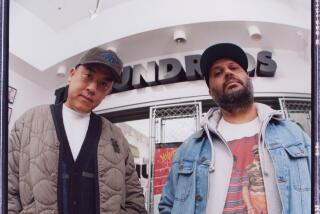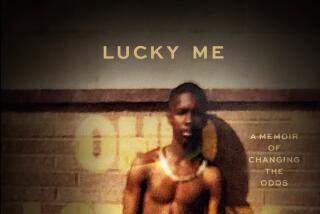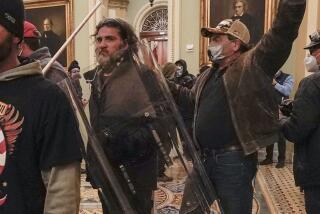Pep Boys May Be Loser in Its âCelebrationâ
Phillip Snellings of Spotsylvania, Va., is the proud owner of a Manny, Moe & Jack T-shirt.
Snellings may not be aware of the magnitude of his achievement. He is the only winner of a Manny, Moe & Jack T-shirt, or indeed any other prize in Pep Boysâ big 70th Anniversary Contest--in essence, the grand-prize winner.
A T-shirt doesnât seem a very grand prize, and in fact it wasnât billed as one. What Pep Boys actually dangled in front of Snellings and 17,999,999 other potential winners was an array of prizes much more impressive. The grand prize was $70,000. First prize was a Mazda Miata. Second prize was one of 70 compact disc players. And third prize was the T-shirt--700 of them, 699 âunclaimed,â like everything else.
As contests go, this was no crowd pleaser and not much of a âcelebration,â which is what Pep Boys called it. Celebrations involve candles, parades, ceremonies, if not festivities. The implication is that the celebrants are marking some occasion--in this case 70 years in business--and inviting others (here, valued customers) to join them.
The celebration took place in April when Pep Boys ran a weeklong â70th Anniversary Match and Win Game.â Eighteen million eight-page advertising circulars were tucked into Sunday newspapers across the country and placed in Pep Boys stores (320 in 18 states). Each had a little box on Page 6 bearing what âcould be your lucky numberâ if it matched a winning number posted in the stores.
All seemed aboveboard. No purchase was necessary. Contest odds ranged from 1 in 26,000 for the T-shirts to 1 in 18 million for the grand prize. The full list of winners was available by written request.
In retrospect, however, the celebration shtick was probably not the best choice. It got peopleâs hopes up, fun-wise, and there is no indication that they were met at any of the 320 stores with anything approximating fun. Better simply to launch an open appeal to greed and fantasy, like state lotteries, or the Readerâs Digest annual sweepstakes.
It may also have been unwise to have no winners, going against the most fundamental expectation. Most people know their own hopes may come to nought, but not the whole contest. âOf course, a company doesnât have to give away anything,â says Stuart Rubin of Sherman Oaks, who felt cheated by the whole business. âBut if they lead the public to believe they will and draw customers into the stores on that line, then it seems to me that they have a greater responsibility.â
This wasnât the view of the sponsor. Itâs hard to find anyone at Pep Boysâ Philadelphia headquarters with any knowledge or interest in the outcome of the contest, which was run by an outside game company. Apparently, no one even wrote away for the list of winners. âI thought I heard of some CD players (awarded),â a company spokesman said, âbut I could be wrong.â
Technically, thereâs probably nothing wrong with Pep Boysâ little (very little) celebration. On the federal level, there are Federal Trade Commission rules only for games run by food retailers and gas stations. Some states have rules as well, a few even requiring registration, with description, of contests planned.
Pep Boys, moreover, didnât choose to run a sweepstakes, like the Readerâs Digest, which draws from submitted entries until all prizes are awarded. This was a âpre-selectionâ game, meaning that the winning numbers were chosen ahead and matching numbers distributed at random. Apparently 771 of Pep Boysâ 772 winning numbers, once distributed, just never surfaced again, at least not in the form of claims.
This system has real advantages for a sponsor. Since these pre-selected winners may never show up, prizes donât have to be pre-bought. The sponsor isnât stuck with a cache of cash or a car or a pile of electronic equipment or, God forbid, 700 promotional T-shirts.
The classy way to handle unclaimed stuff is to hold a second-chance sweepstakes, drawing from all the losing numbers submitted. The sponsor doesnât have to give out everything--just the grand prize, perhaps, or enough T-shirts to generate goodwill.
But building goodwill isnât always the aim of these games. Building traffic is. âYouâd be surprised how rarely thereâs any post-promotion hoopla,â says Peggy Heetmann, vice president of Promotion Mechanics in Newtown, Conn., which ran the game. âOnce you have the consumer in the store, youâve met your main objective.â
In Pep Boysâ case, even the traffic seems unimpressive. If there had been more traffic (or fewer numbers), there might have been more winners. Even the existent traffic seemed unenthusiastic: Everyone entering was eligible for a 10% discount coupon, but only 1,133 claimed them (in writing, as required). Maybe they could tell that Pep Boys wasnât actually celebrating its business-customer relationship--just goosing it.
Seems a little short-sighted to have so few winners--except for Pep Boys itself. But it was just a game, with no real damage to anyone--except Pep Boys itself.


